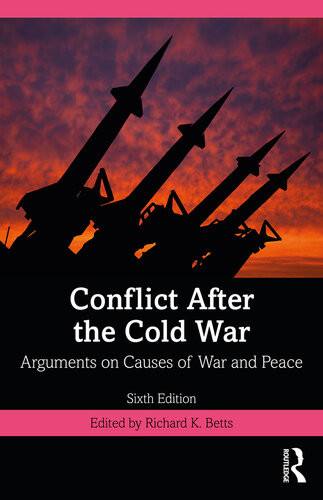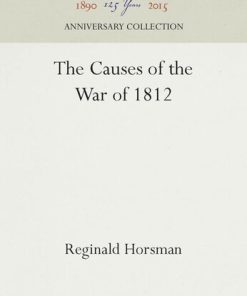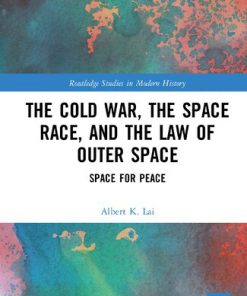Conflict After the Cold War Arguments on Causes of War and Peace 6th Edition by Richard Betts 1032010088 9781032010083
$50.00 Original price was: $50.00.$25.00Current price is: $25.00.
Conflict After the Cold War Arguments on Causes of War and Peace 6th Edition by Richard Betts – Ebook PDF Instant Download/Delivery: 1032010088, 9781032010083
Full download Conflict After the Cold War Arguments on Causes of War and Peace 6th Edition after payment

Product details:
ISBN 10: 1032010088
ISBN 13: 9781032010083
Author: Richard K. Betts
Edited by one of the most renowned scholars in the field, Richard K. Betts’s Conflict After the Cold War assembles classic and contemporary readings on enduring problems of international security. Offering broad historical and philosophical breadth, the carefully chosen and excerpted selections in this popular reader help students engage in key debates over the future of war and the new forms that violent conflict will take. Conflict After the Cold War encourages closer scrutiny of the political, economic, social, and military factors that drive war and peace. New to the Sixth Edition Eight new readings covering issues that have grown in salience since the previous edition or that present new interpretations of answers to old problems, including pieces by Robert Kagan, Edward O. Wilson, Scott D. Sagan, Robert Jervis and Jason Healey, Jacqueline L. Hazelton, Oystein Tunsjo, and Michael Beckley. Updated volume and chapter introductions and a new reading by Richard K. Betts.
Conflict After the Cold War Arguments on Causes of War and Peace 6th Table of contents:
Part I Visions of Conflict and Peace
1.1 The End of History?
1.2 Why We Will Soon Miss the Cold War
1.3 The Clash of Civilizations?
1.4 The Strongmen Strike Back
Part II International Realism: Anarchy and Power
2.1 The Melian Dialogue
2.2 Doing Evil in Order to Do Good
2.3 The State of Nature and the State of War
2.4 Realism and Idealism
2.5 The Origins of War in Neorealist Theory
2.6 Hegemonic War and International Change
2.7 Power, Culprits, and Arms
Part III International Liberalism: Institutions and Cooperation
3.1 Perpetual Peace
3.2 Peace Through Arbitration
3.3 Community of Power vs. Balance of Power
3.4 Liberalism and World Politics
3.5 Power and Interdependence
3.6 The Obsolescence of Major War
Part IV Psychology and Culture: The Human Mind, Norms, and Learning
4.1 Why War?
4.2 How Good People Do Bad Things
4.3 War and Misperception
4.4 Spirit, Standing, and Honor
4.5 Warfare Is Only an Invention—Not a Biological Necessity
4.6 People Must Have a Tribe
4.7 Men, Women, and War
Part V Economics: Interests and Interdependence
5.1 Money Is Not the Sinews of War, Although It Is Generally So Considered
5.2 The Great Illusion
5.3 Paradise Is a Bazaar
5.4 Imperialism, the Highest Stage of Capitalism
5.5 Imperialism and Capitalism
5.6 War as Economic Policy
5.7 Structural Causes and Economic Effects
5.8 Trade and Power
Part VI Politics: Ideology and Identity
6.1 Democratization and War
6.2 Nations and Nationalism
6.3 Possible and Impossible Solutions to Ethnic Civil Wars
6.4 The Troubled History of Partition
Part VII Military Technology, Strategy, and Stability
7.1 Cooperation Under the Security Dilemma
7.2 The Offensive/Defensive Balance of Military Technology
7.3 Why Nuclear Proliferation May Be Good
7.4 Why Waltz Is Wrong
7.5 The Dynamics of Cyber Conflict
7.6 Is Strategy an Illusion?
Part VIII Terrorism, Revolution, and Unconventional Warfare
8.1 The Strategic Logic of Terrorism
8.2 Speech to the American People
8.3 Science of Guerrilla Warfare
8.4 On Guerrilla Warfare
8.5 Patterns of Violence in World Politics
8.6 Insurgency and Counterinsurgency
8.7 Principles, Imperatives, and Paradoxes of Counterinsurgency
8.8 The “Hearts and Minds” Fallacy
Part IX Threat Assessment and Misjudgment: Recurrent Dilemmas
9.1 The German Threat? 1907
9.2 The German Threat? 1938
9.3 The Threat to Ukraine From the West
9.4 China: The Return of Bipolarity
9.5 China: The Overestimated Threat
9.6 How Could Vietnam Happen? An Autopsy
Part X New Threats and Strategies for Peace
10.1 Environmental Changes as Causes of Acute Conflict
10.2 Why Cyberdeterrence Is Different
10.3 The Dark Side of Progress
10.4 A World of Liberty Under Law
10.5 Peace Among Civilizations?
People also search for Conflict After the Cold War Arguments on Causes of War and Peace 6th:
6 common causes of conflict
3 causes of the cold war
4 causes for the cold war
ultimately the cold war was an ideological war about
Tags:
Richard Betts,Conflict,War,Arguments
You may also like…
Uncategorized
Politics & Philosophy - Government & Politics
Conflict in Ukraine The Unwinding of the Post Cold War Order 1st Edition Rajan Menon Eugene Rumer
Uncategorized
History - World History
The Cold War, the Space Race, and the Law of Outer Space: Space for Peace 1st Edition Albert K. Lai
History - American Studies
John Foster Dulles and the Diplomacy of the Cold War 1st Edition Richard H. Immerman
History - Asian History
Choosing War The Lost Chance for Peace and the Escalation of War in Vietnam Fredrik Logevall
Politics & Philosophy - International Relations
Cold Peace Avoiding the New Cold War 1st Edition Michael W. Doyle
Uncategorized
Relationships & Lifestyle - Diet & Nutrition











